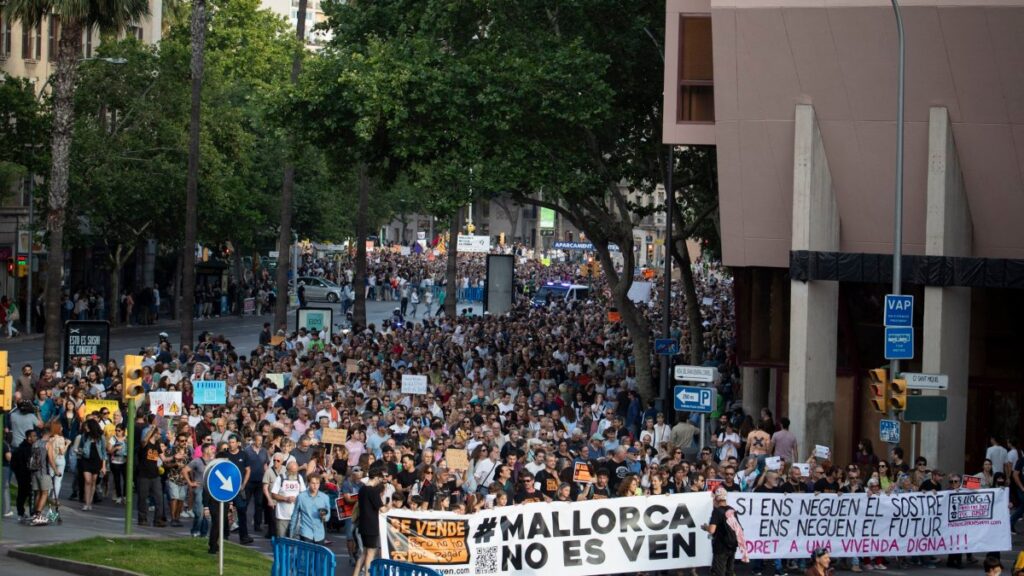Thousands of people marched through the streets of Menorca and Mallorca this weekend in protest against mass tourism and overcrowding.
Around 10,000 people took part in protests on Mallorca on Saturday, while hundreds marched on Menorca carrying signs reading “SOS, residents” and “Enough with mass tourism”, a Spanish national police spokesman said.
“We call on the authorities to ban people who haven’t lived here for more than five years from buying property and to tighten regulations on holiday accommodation,” said Carme Reynes, whose group organised the protest in Palma de Mallorca.
But protesters say holiday rental fees are driving locals out and “mass tourism” is causing problems with access to housing and water control.
Protesters in Mallorca said they wanted to ban people who have not lived on the island for five years from buying property and to tighten regulations on holiday accommodation.
Menorca’s Balearic Islands Ornithology and Nature Conservation Group (GOB Menorca) argued on its website that tourism contributes to “problems of access to housing, water management and economic diversification on the island”.
Real estate agent Javier Carbonell said more than half the properties were being used for holiday lettings, making them unaffordable for locals.
“We want to reduce mass tourism and increase sustainable tourism,” Carbonell said.
British holidaymakers were urged to stay away from the Balearic Islands last month as tourism had reached its “limit”, according to Marga Progens, president of the Balearic Islands regional government.
She said after protests erupted in May that authorities must target “quality tourism” rather than simply trying to attract more tourists.
In the Balearic Islands, a popular destination for British holidaymakers, tourism accounts for about 45 percent of gross domestic product, according to data from industry group Exceltur.
Read next

The Balearic Islands were Spain’s second most popular tourist region after Catalonia last year, attracting 14.4 million holidaymakers, according to data from the Spanish National Statistics Institute.
Around 18 million tourists are expected to visit Catalonia in 2023, while 13.9 million will visit the Canary Islands.
Saturday’s demonstration was the latest in a wave of anti-tourism protests that have spread across Spain in recent months, with residents saying they can no longer afford to live in their towns because of the proliferation of short-term rentals like Airbnb.
It comes after the Balearic Islands tightened restrictions on street drinking and party boats to crack down on booze holidays as part of a wider backlash against mass tourism.
Local governments on the islands have strengthened laws passed in 2020 that apply to the most popular resort destinations, including Playa de Palma and Magaluf in Mallorca, and Sant Antoni in Ibiza, and mean anyone found drinking outside permitted areas will be fined between 500 and 1,500 euros (430 to 1,290 pounds).
Earlier this month, dozens of protesters occupied Mallorca’s beaches on Saturday, arguing that increasing tourism is driving up rents for residents and putting a strain on public services.
Protesters gathered in the resort town of Colonia de Sant Jordi, east of the island’s capital, Palma de Mallorca.
Thousands of protesters also took to the streets in other tourist destinations, including Ibiza, Barcelona and the Canary Islands.
“We want new tourist restrictions and a ban on further construction of illegal apartments,” said Rafael Jimenez, spokesman for Prou Ibiza, which organised the protests on the island.
“With fewer apartments on the market, prices go up.”
In April, thousands of people protested in the Canary Islands, calling for a temporary ban on tourists to stem soaring housing costs for locals caused by a surge in short-term vacation rentals and hotel construction.


